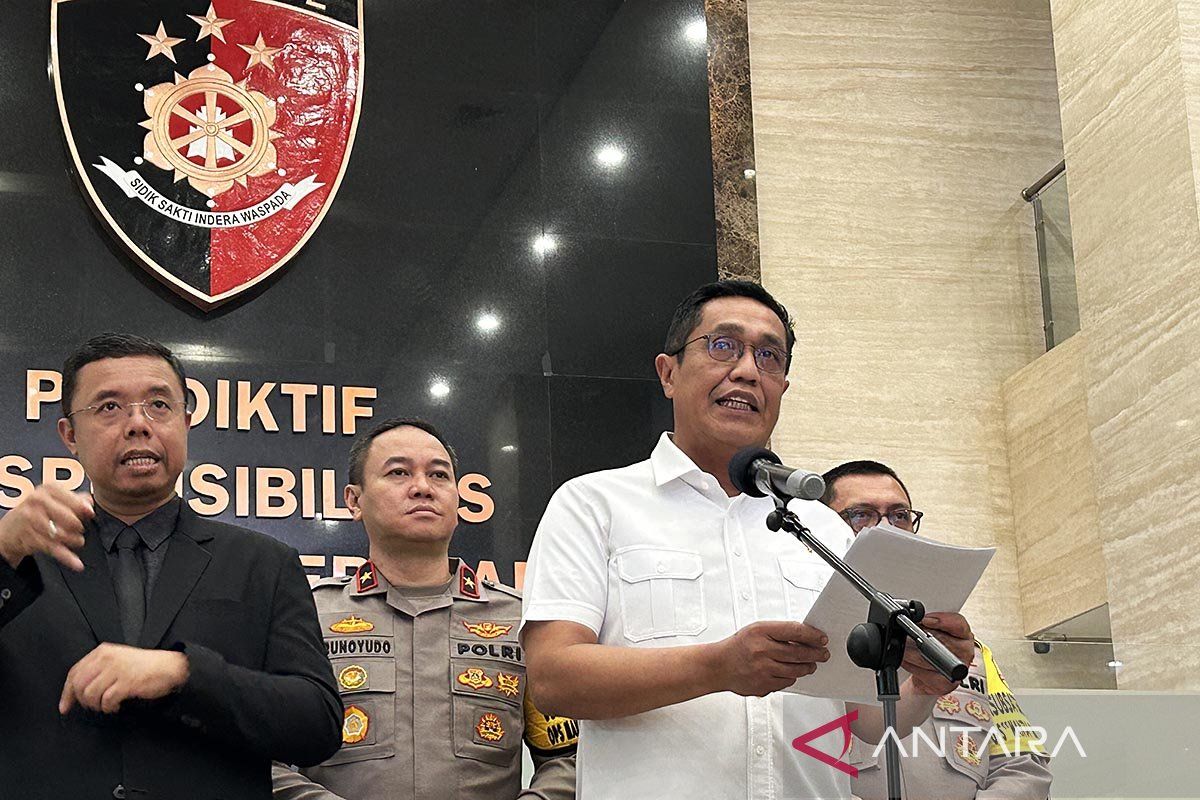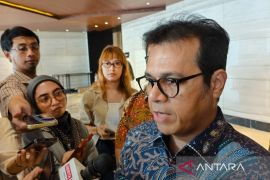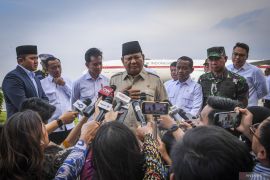This case came to light after four Indonesian students taking part in a ferienjob complained to the Indonesian Embassy in Berlin.
After being investigated by the Indonesian Embassy, 33 universities in Indonesia were suspected of being involved in the case, with a total of 1,047 students being victims of this transnational crime.
The National Police (Polri) then investigated this case and named five suspects, all of whom are Indonesian citizens, comprising two people in Germany and three others in Indonesia.
They were charged under Article 4 of Law Number 21 of 2007 concerning Human Trafficking Eradication, with the threat of imprisonment for a maximum of 15 years and a fine of Rp600 million (US$37,890).
The five suspects, namely ER alias EW (39), A alias AE (37), AJ (52), SS (65), and MA (60), can also be charged under Article 81 of Law Number 18 of 2017 concerning the Protection of Indonesian Migrant Workers, with a maximum threat of 10 years imprisonment and a fine of up to Rp15 billion.
According to the police, the students got information about ferienjobs advertised by PT CVGEN and PT SHB on their campuses.
The perpetrators lured students by promising an internship program equivalent to 20 college credits. They also made a false claim that the program was registered under the Ministry of Education, Culture, Research, and Technology.
To be able to partake in the internship program, students are required to pay a registration fee of Rp150,000 to the PT CVGEN account and shell out €150 to make a letter of acceptance (LoA) to PT SHB.
After the LoA is issued, the victim must pay another €200 to PT SHB for approval or a work permit from the German authorities.
Students also received a loan of Rp30 million to Rp50 million that must be returned by deducting their wages every month.
On arrival in Germany, the students were immediately presented with a work contract letter from PT SHB and a work permit to be registered with the German Ministry of Manpower.
The students, who were victims, took part in ferienjobs for a period of three months, from October to December 2023.
False Promises
Instead of taking part in educational internships that can be converted into study credits in Indonesia, several students revealed that they had to do physical work in Germany.
One of the victims, with the initial N from Jambi, said he had to work as a package porter at an international logistics company in Bremen, Germany.
N said that the job of transporting packages, some weighing 30 kilograms and 40 kilograms, did not differentiate between men and women workers.
While working, they were closely monitored and were not allowed to help one another. The heavy physical work led to several students falling ill in their first week of work.
N also revealed that the students were not allowed to translate the contents of the work contract written entirely in German when they signed it on October 16, 2023.
So, what exactly is ferienjob?
Referring to information on the Indonesian Ministry of Foreign Affairs website released in response to this case, this job is part-time work during the official semester holidays.
Regulated in Article 14, paragraph 2 of the German Employment Ordinance (Beschaftigungsverordnung/BeschV), ferienjobs are not internships but are part of the labor market.
The types of jobs offered are generally work relying on physical labor, such as lifting logistics boxes, packaging goods for delivery, washing dishes in restaurants, or handling suitcases at the airport.
The Ministry of Foreign Affairs emphasized that such jobs did not fall under the realm of the framework of bilateral cooperation between governments. This program is also not related to students' academic activities and/or academic competencies.
Ferienjob programs aim to fill the shortage of physical labor in various German companies by offering opportunities to students on holiday breaks.
According to German regulations, the maximum ferienjob work period is 90 days, within a 12-month period during official semester holidays in the country of origin, and cannot be extended.
In March 2022, the German Federal Employment Agency published information regarding the requirements and procedures for accepting ferienjobs in Germany. Ferienjobs are offered to students in European Union (EU) countries, and for non-EU countries only starting in 2022.
Governance Improvement
Apart from the false promises, the emergence of this ferienjob case could be triggered by unclear governance of internship programs for Indonesian students abroad.
In contrast to the departure pattern for Indonesian migrant workers, which is in accordance with the law and regulated by the Ministry of Manpower in collaboration with the Indonesian Migrant Worker Protection Agency (BP2MI), until now, there are no clear arrangements for Indonesian students looking to take up internships abroad.
Director General of Vocational Education at the Ministry of Education and Culture, Kiki Yuliati, stated that ferienjob is not included in the Independent Learning of Independent Campus (MBKM) program.
Internships included in the MBKM program are not held during the holidays but in the current semester because they must contribute to students' academic grades or achievements.
Apart from that, internships included in MBKM must be related to learning to strengthen students’ competencies in their study program.
Yuliati emphasized that the government requires internship organizers included in the MBKM program to design activities that can train students' hard and soft skills.
She then addressed misinformation in society regarding internships that are perceived as MBKM internships.
However, this confirmation from the Ministry of Education and Culture is not sufficient to prevent the recurrence of cases of human trafficking under the guise of international internship.
After the case was revealed, the Coordinating Ministry for Human Development and Culture said it was conducting an evaluation and would improve regulations to facilitate Indonesian students doing internships abroad.
The ministry’s Deputy for Coordination of Education Quality Improvement and Religious Moderation, Warsito, expressed hope that this case would not discourage students from taking up internship activities.
He said that the overseas internship program will continue since it can improve students' skills competency and work experience.
However, the regulation for conducting overseas internship needs some improvement in its governance, including for the party responsible for sending the students, for which the ministry allowed to give permission to agencies, and the issue of internship fees.
The regulation must also regulate the internship period, the mentoring process, and the salary regulation in addition to ensuring that the job taken is in line with their major.
The government must also clearly explain the definition between the two types of internship programs, both educational internships and job seeker internships, as well as the criteria for each program.
Be Careful
While waiting for the government to complete regulatory improvements, students and universities in Indonesia are urged to be careful about offering overseas internships.
Director of Protection for Indonesian Citizens and BHI at the Ministry of Foreign Affairs, Judha Nugraha, called on students to carefully study internship offers abroad by ensuring the credibility of the company/end user in the destination country and ensuring the agency has an official permit from the government.
Before leaving, students must sign an internship contract in Indonesia and not after arriving in the destination country as had occurred in the last ferienjob case.
Students are required to understand their internship contract, the scope of work, working conditions, and their rights and obligations.
Students must also follow official procedures for overseas internship according to the regulations in Indonesia.
The ferienjob case is also a reminder and eye-opener for Indonesian students to not be easily lured by overseas internship offers.
The campus should also strengthen supervision for its students and prioritize cooperation programs with foreign parties without going through third parties, such as PT CVGEN and PT SHB.
Related news: Ministry prevent human trafficking in internship from recurring: DPR
Related news: VP calls for action on human trafficking affecting Indonesian students
Translator: Yashinta Difa P, Resinta Sulistiyandari
Editor: Anton Santoso
Copyright © ANTARA 2024












